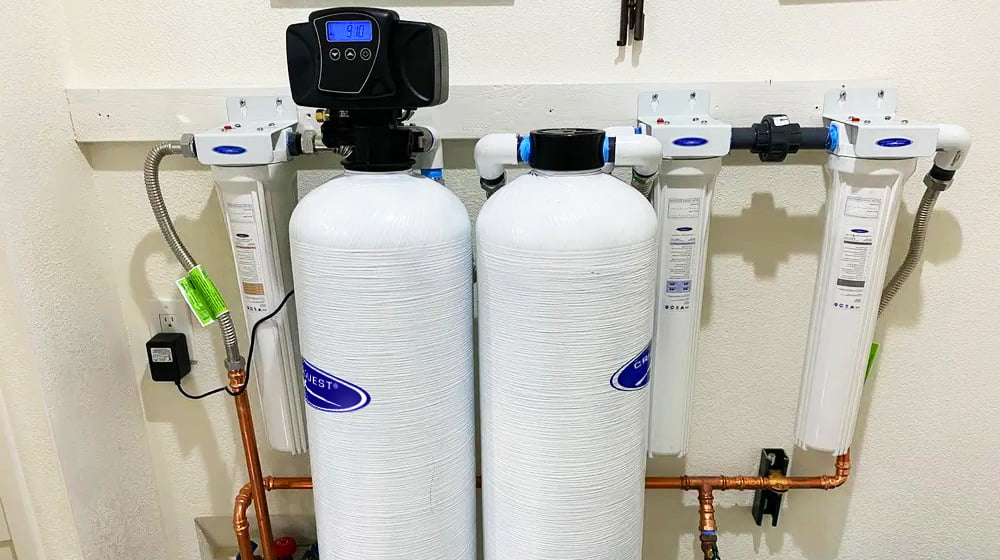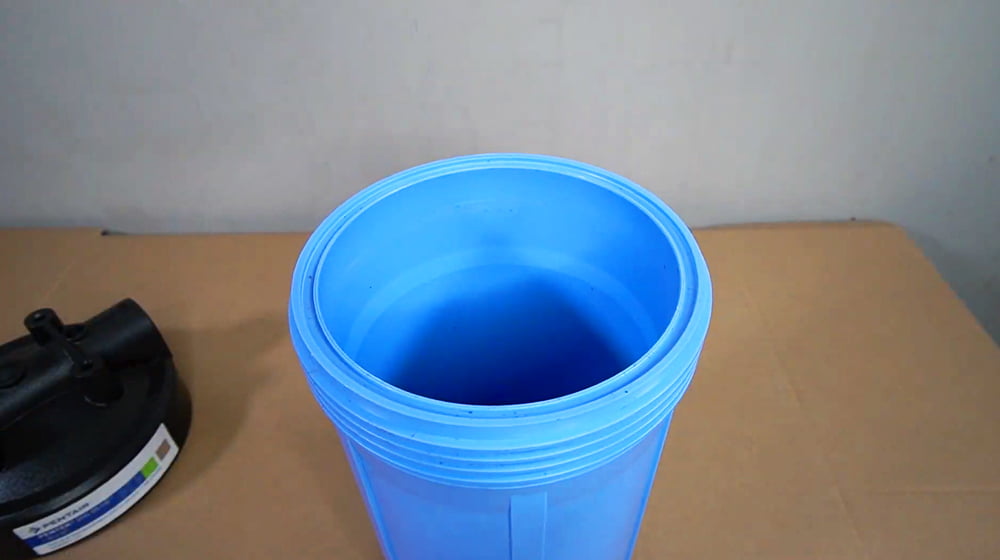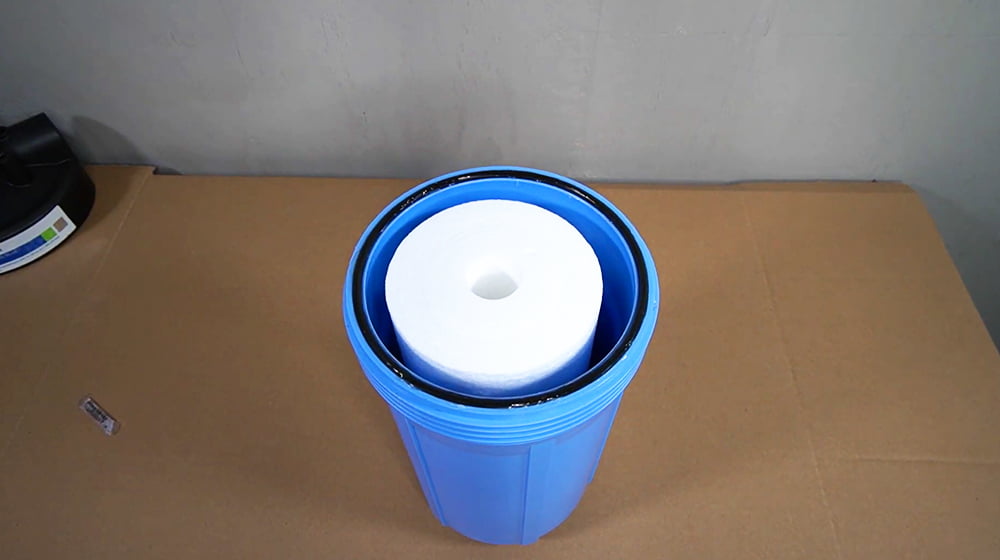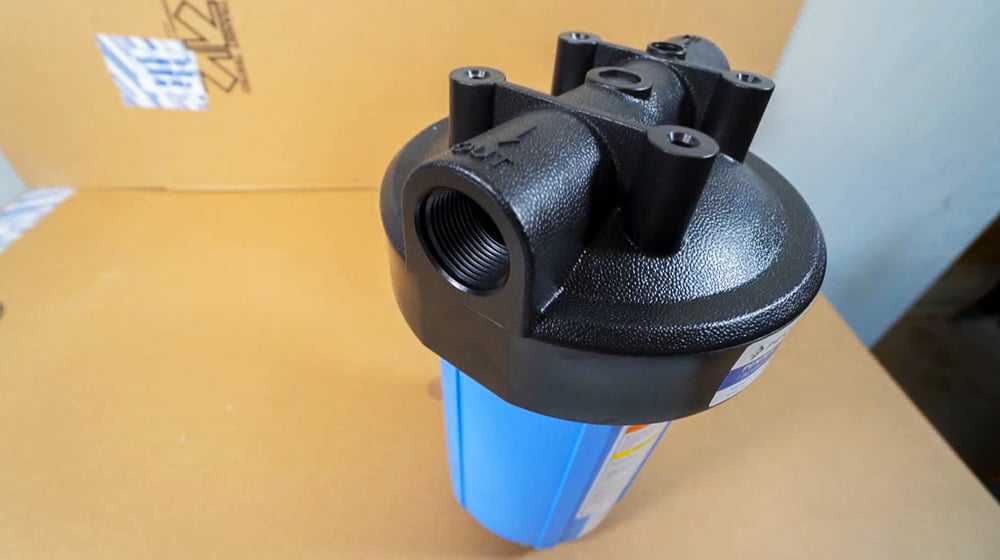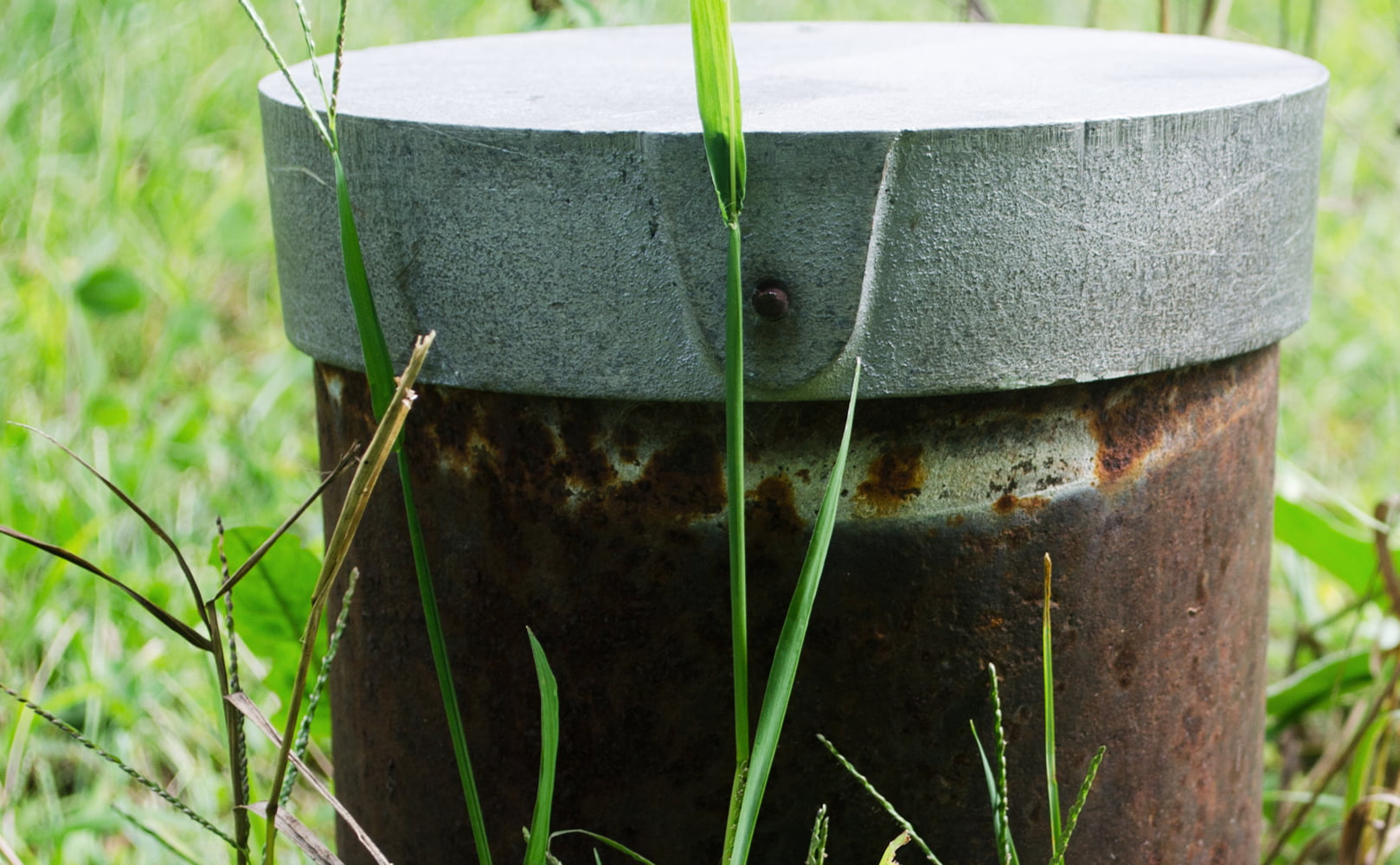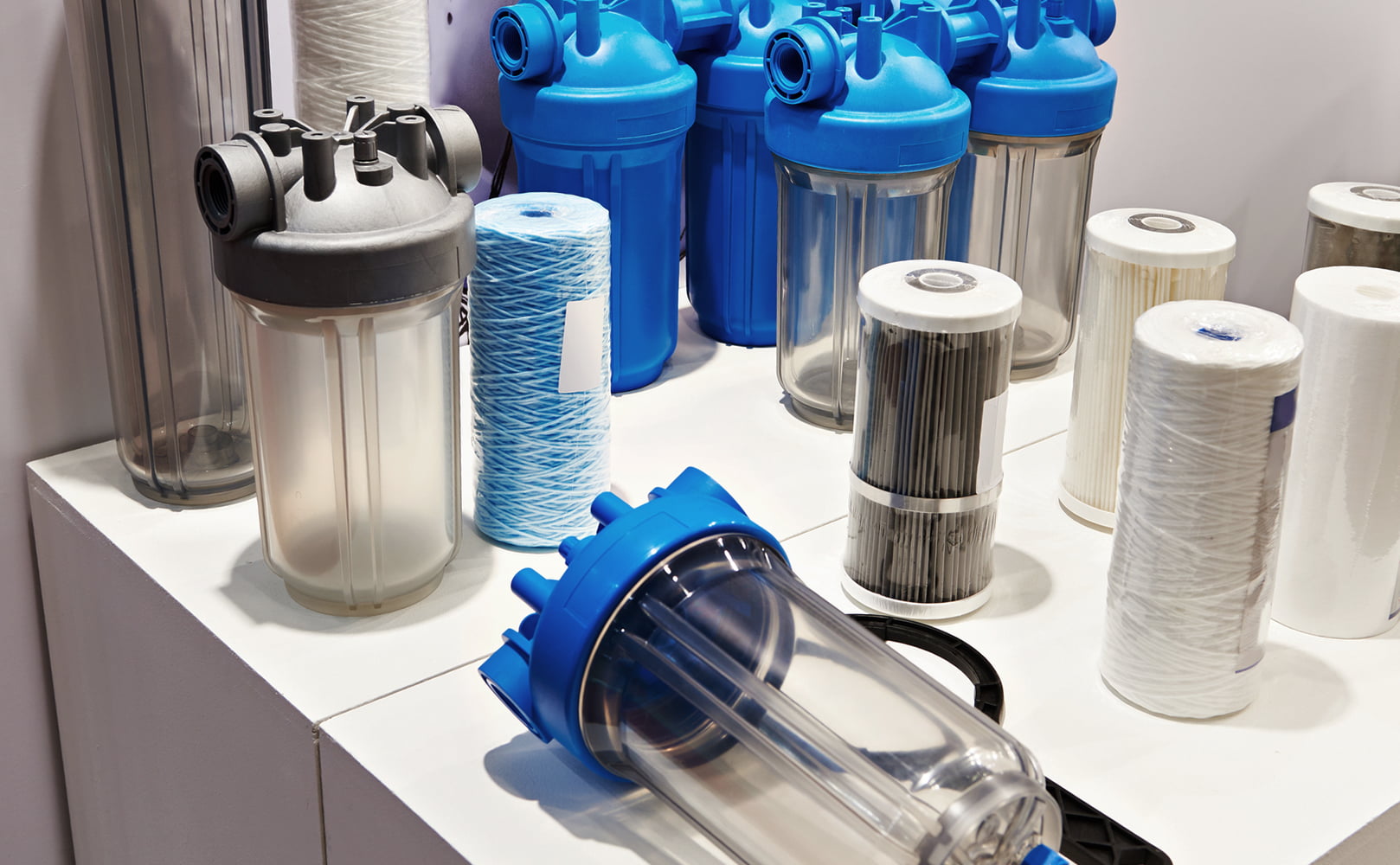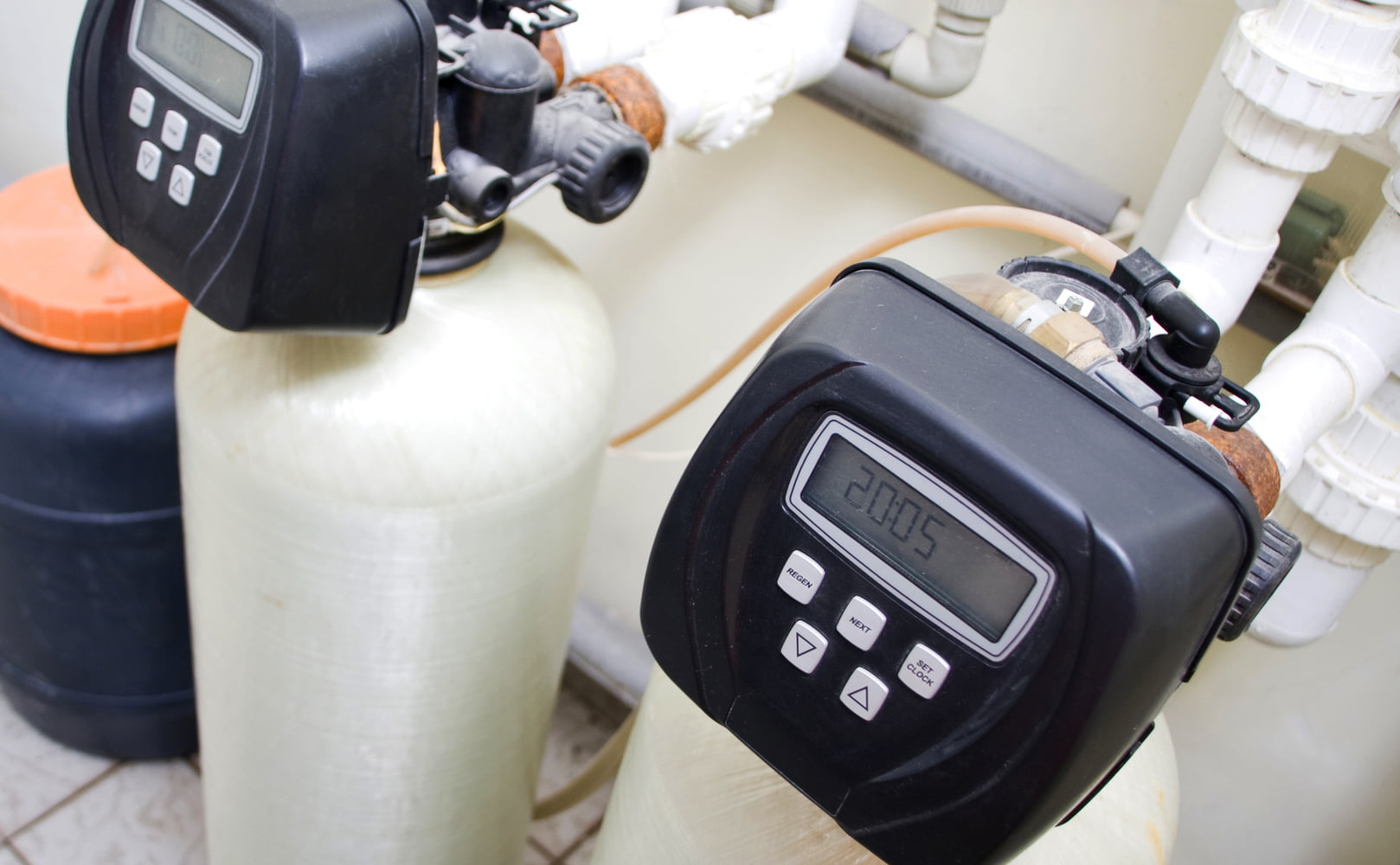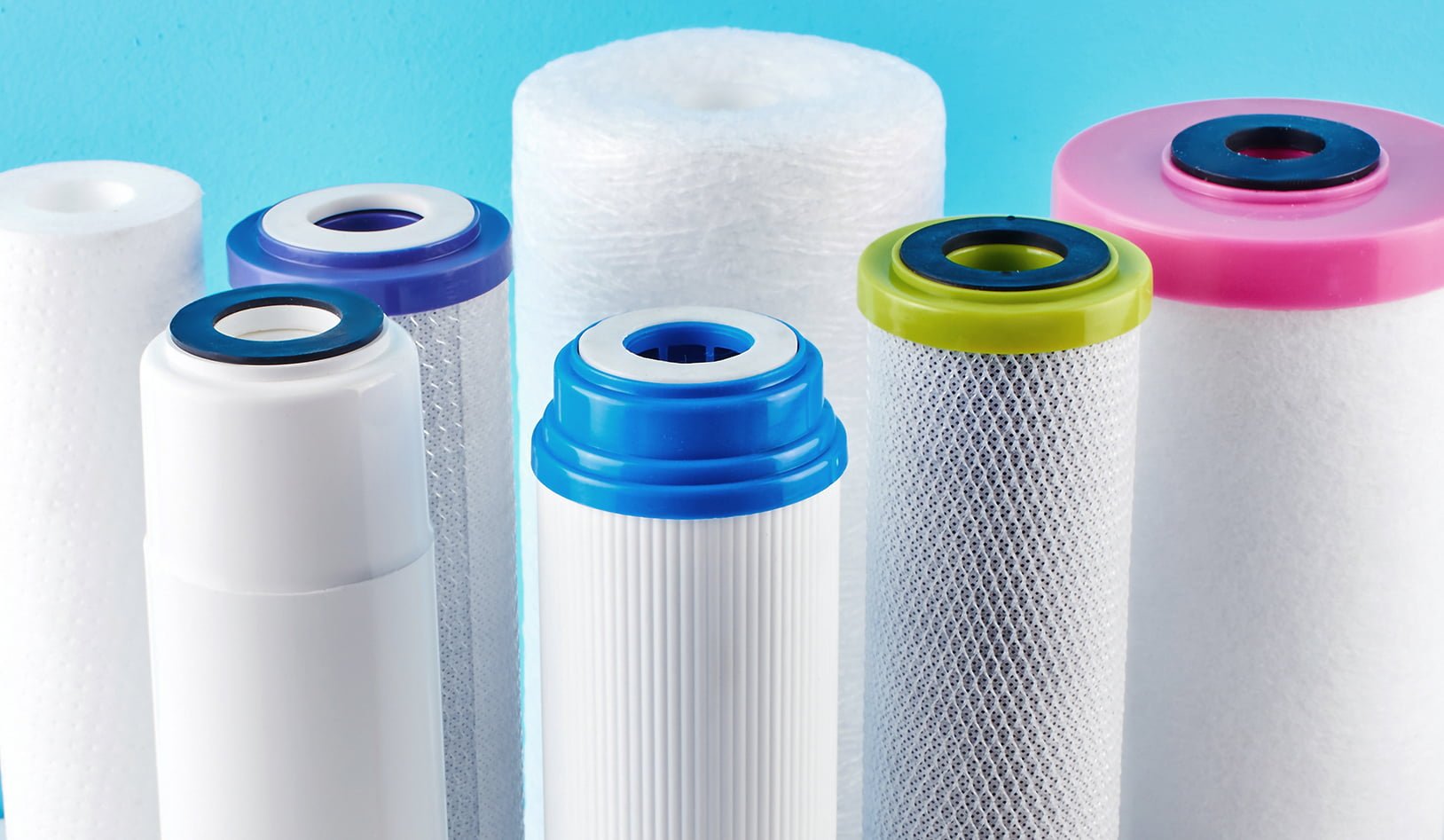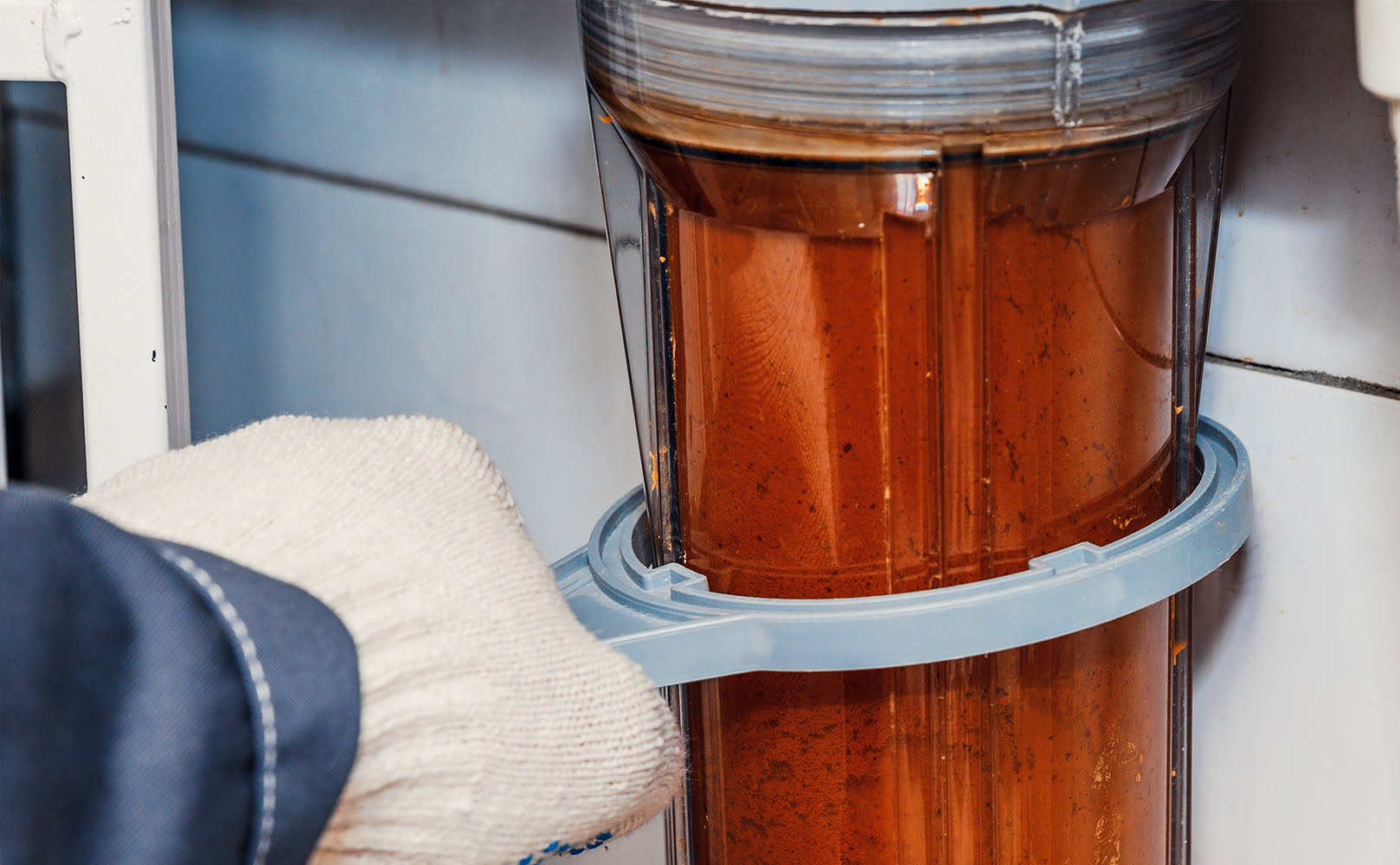7 Best Sediment Filters for Well Water (*Update 2024)
Written by: Gene Fitzgerald // Expert Fact-Checking: Buddhini Dolapihilla, MBSS // Last Updated: Jan 31, 2024
This page may contain affiliate links. If you buy a product or service through such a link we earn a commission at no extra cost to you. Learn more.
Looking for the perfect sediment filter (for well water)? Well, you’re in luck because we’ve done all the hard work for you! With countless options out there, finding the right system can be as tricky as untangling a knot of garden hoses. Fortunately for you, we’ve spent countless hours diving deep into the world of sediment filters to bring you the crème de la crème.
Since our buying guide first hit the shelves on December 7, 2021, we’ve evaluated over 16 top-notch filters, leaving no stone unturned in our quest for H2O perfection. From researching to reviewing, testing to comparing, and even upgrading our guide, we’ve poured our heart and soul into ensuring that our recommendations are as reliable as your morning cup of joe.
So sit back, relax, and let us be your sediment water filter fairy godmother. We’ve got the facts, the figures, and the filter know-how to help you make the best buying decision possible. Cheers to clean and pristine water for all!
No Time to Read? Check Our List of the Best Sediment Filters!
| Filter | Details | |
|---|---|---|
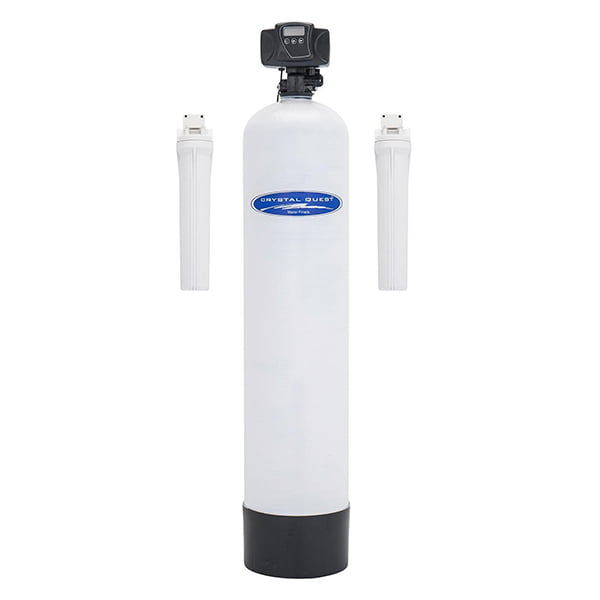 Best Sediment Filter: Crystal Quest |
Get 5% Off! Use Code: |
Price: $$$ Microns: 5 Flow Rate: 9-13 gpm Filter Life: 5+ Years Annual Cost: ~$40 Read Review: Click |
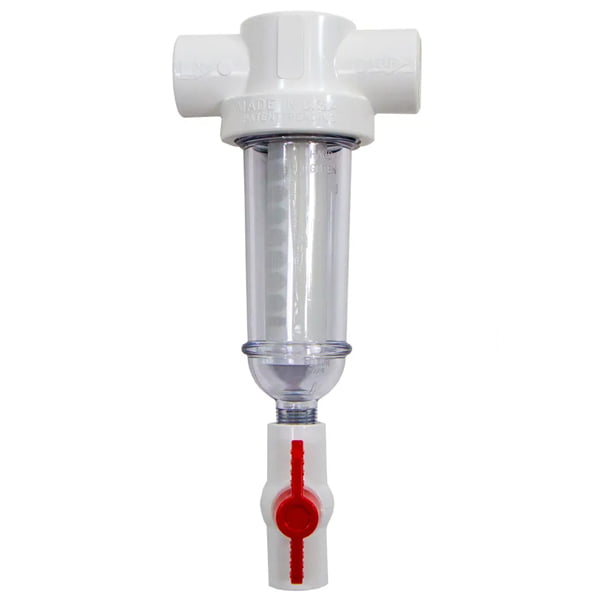 Best Spin-Down: USWS |
|
Price: $ Microns: 15-711 Flow Rate: 25 gpm Filter Life: – Annual Cost: – Read Review: Click |
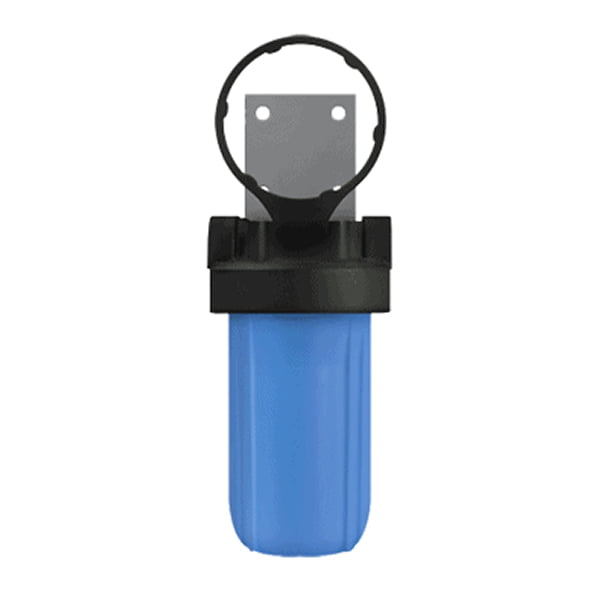 Best Cartridge-Based: SpringWell PF |
Get 5% Off! Use Code: |
Price: $ Microns: 5 Flow Rate: 20-35 gpm Filter Life: 6 Months Annual Cost: $35-65 Read Review: Click |
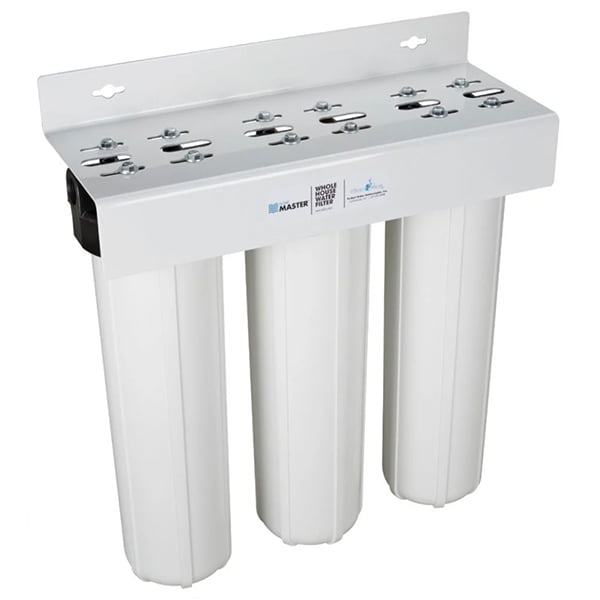 Best Multi-Stage: Home Master |
Get Free Shipping! Use Code: |
Price: $$ Microns: Varying Flow Rate: Up to 20 gpm Filter Life: Up to 1 Year Annual Cost: Varying Read Review: Click |
Best Whole House Sediment Filter Reviews
Currently, our evaluation is mostly based on these key factors: Sediment reduction (25%), filter capacity (25%), affordability (20%), direct testing and user opinions (10%), flow rates (10%), support and product warranty (10%).
Our Top Picks
- Crystal Quest – Best Overall
- USWS Spin-Down – Best Spin-Down
- SpringWell PF – Best Cartridge-Based
- Home Master Custom Whole House Sediment Filter – Best Multi Stage
- Waterdrop WD-RPFK – Spin-Down Runner-Up
- Pelican – Single Stage Runner-Up
- Culligan WH-HD200-C & WH-S200-C – Best Cartridge-Based for Customization
1. Best Whole House Sediment Filter for Well Water & City Water: Crystal Quest
In our opinion, the best sediment filter for well water AND tap water in 2024 is the Crystal Quest. That’s because it combines effective removal of suspended solids down to 5 micron in size with a long service life of 5 years minimum (750,000-1,000,000 gallons). 5 stars!
Gallery
Pros
- The whole house sediment filter system features 3 stages of filtration.
- First comes a standard 5-micron sediment pre-filter. It catches silt, sand, dirt, and other solid particles.
- This is followed by a large mineral tank containing natural Zeolite. The Zeolite is tested to remove any sediment and other suspended matter down to the 5-micron range.
- The Zeolite granules are larger than usual with an irregular shape and fractured edges. This makes the water’s flow path more complex. The result: More efficient sediment removal throughout the entire filter bed at minimum pressure loss. Screening and caking of sediment at the top of the filter media is prevented allowing for longer runs between backwashes.
- Filter media is lightweight for lower backwash rates saving you water.
- KDF filtering media is added in order to prevent bacterial growth inside the system.
- For post-filtration, the water passes through a carbon block filter removing chemicals like industrial solvents and improving its taste.
- 2 filter sizes available:
- 1.5 cubic feet resin has 750,000-gallon filtering capacity and delivers 9-11 gallons of filtered water per minute.
- 2.0 cubic feet system lasts 1,000,000 gallons at 10-13 gpm water flow.
- The fiberglass casings can be upgraded to stainless steel for higher durability.
- Installation is easy and clear with solid instructions in the user manual.
- Maintenance doesn’t require much time or money. Pre and post-filter cartridges need replacement every 12-18 months at about $40 annually.
- Crystal Quest offers a 1-year limited warranty.
Cons
- More costly than the standard cartridge-based sediment filter.
Best for
The Crystal Quest Turbidity Whole House Water Filter is best for both people on well and tap water who want a system that’s easy to install & service and very effective.
2. Best Spin-Down System: USWS
Spin-down filters are used to capture large particulates. They do the heavy lifting removing big chunks and debris, rust, and sand from water. Spin-down filters are not to be confused with fine-micron sediment filter cartridges designed to trap suspended solids down to 1 micron in size.
In other words, the USWS spin-down sediment filter is ideal if you have well water heavily laden with sediment. 5 stars!

USWS Centrifugal Sediment Spin-Down Filter |
|
| Price: | $ |
| Mesh Size: | 15-711 Micron |
| Water: | 25 gpm |
| Filtration Capacity: | – |
| Annual Cost: | – |
|
Our Rating
|
|
Pros
- US-made + affordable.
- Filter can be used as a first defense against sediments in water.
- System is designed to filter out large sediment chunks and particles.
- Choose from a range of micron sizes (between 15 micron for fine sand, dust, etc. and all the way up to around 700 microns for large debris).
- The head is shaped to create a circular movement of the water. Due to centrifugal force, sediment is pushed to the outside of the filter housing. It can settle at the bottom and flushed out by opening the valve.
- There are no cartridges to replace.
- Mesh screen is also easy to clean by hand and can be reused.
- Clear filter housing allows you to check for accumulated dirt and determine when to clean.
- 25 gpm flow rate guarantees zero pressure loss.
- DIY installation approved.
Cons
- US Water Systems says there are IAPMO certifications for low lead content, but we couldn’t find them online.
Best for
With its variable mesh size, USWS’s spin-down filter is best for removing high levels of fine to coarse sediment without clogging.
3. Best Cartridge-Based: SpringWell PF
In our opinion, the best regular sediment filter is the SpringWell PF – not so much for the filter itself but everything that comes with it: All the components you need for installation, detailed written instructions + video, 6-month satisfaction guarantee, and lifetime warranty.

SpringWell PF 5-Micron Sediment Filter |
|
| Price: | $ |
| Micron Rating: | 5 |
| Water: | 20-35 gpm |
| Filtration Capacity: | 6 Months |
| Annual Cost: | $35-65 |
|
Our Rating
Get 5% Off! Use Code: |
|
Gallery
Pros
- Perfect for removing sediment down to 5 microns in size. This also includes sand, rust particles, and dust.
- Usually installed before the main treatment system.
- Melt-blown polypropylene has good resistance against chemicals and changes in water temperature.
- You can choose from 2 different sizes:
- PF-10 filter (10-inch) gives you up to 20 gallons per minute water flow.
- PF-20 (20-inch) provides 35 gpm and even more.
- With any of the two versions, a drop in water pressure is highly unlikely.
- Filter housing, O-rings, mounting bracket and all other components required for successful installation are part of the package.
- SpringWell also provides detailed installation instructions as well as a video.
- You can use the included filter spanner to change the cartridges every 6 months. Cost: $35-65 per year depending on filter size.
- The filter replacement process couldn’t be simpler.
- As usual, SpringWell offers a 180-day satisfaction guarantee which allows you to return the product for a full refund + a lifetime warranty.
Cons
- Somewhat more expensive than most off-the-shelf sediment filters.
Best for
The SpringWell PF is best for simple yet effective removal of sand, rust, and other dirt from water supplies.
4. Best Multi-Stage System: Home Master Custom Whole House Sediment Water Filter
The guys over at Home Master allow you to create your own custom sediment water filter according to your needs. What we like about this approach is that you can choose from a variety of cartridge filters to match your water conditions precisely.
For example, you could create a 3-stage setup starting with a 30-micron sediment filter followed by a 5-micron and a 1-micron cartridge. This way, larger particles are trapped first, smaller ones later on. This prevents rapid clogging of the filters.

Home Master Adaptable Sediment Filter |
|
| Price: | $$ |
| Micron Rating: | 0.2-30.0 |
| Water: | Up to 20 gpm |
| Filtration Capacity: | Up to 1 Year |
| Annual Cost: | Varying |
|
Our Rating
Get Free Shipping! Use Code: |
|
Pros
- You can pick 1, 2, or 3 filter stages.
- You can pick from various filter cartridges:
- 30-micron washable pleated polyester sediment water filter. Traps dirt, sand, silt, and rust particles. Can be reused up to 6 times.
- 5-micron washable pleated polyester sediment filter. Reusable up to 6 times. Reduces sand, silt, dirt, and rust.
- 1-micron absolute pleated sediment filter. Reduces cyst like giardia and cryptosporidium, dirt, sand, silt, and rust. Reusable 1-6 times.
- Multi-gradient polyester sediment filter. 4 layers of 25, 10, 5, and 1 micron. Depth filtration for maximum dirt-holding capacity. Removes silt, sand, dirt, rust, and turbidity.
- 0.2-micron absolute nano fiber sediment filter (pleated). Is tested to remove 99.9% bacteria, viruses, and cysts. Also filters fine silt, clay, rust, and turbidity.
- Thanks to large ports, you get a flow rate of up to 20 gallons per minute, depending on the cartridge filters you use.
- Installation and maintenance are DIY-friendly.
- Varying filtration capacities of up to 1 year. Acceptable replacement filter costs.
- Covered by 2-year manufacturer warranty.
Cons
- No built-in bypass valve.
Best for
This custom Home Master whole house water filter is best for step-down sediment filtration.
5. Whole House Spin Down Sediment Filter for Well Water Alternative: Waterdrop WD-RPFK
As an alternative to the USWS spin-down filter, we recommend the Waterdrop WD-RPFK.
The main difference is that the latter is a heavy duty version with a filter mesh made from molybdenum alloy (as compared to plastic) to be used for many years. Also, pores are 50 microns in size rather than 100. This traps smaller impurities. Lastly, there is the backwashing function for more effective cleaning of the filter screen.
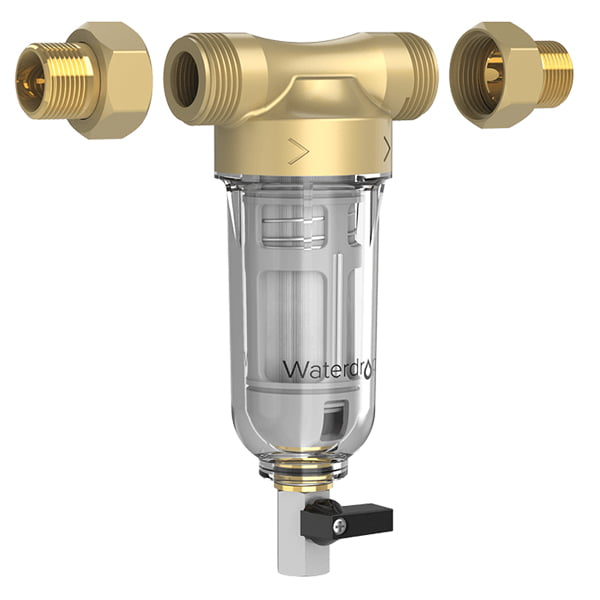
Waterdrop WD-RPFK Spin-Down Sediment Filter for Well Water |
|
| Price: | $ |
| Micron Rating: | 50 |
| Water: | 20 gpm |
| Filtration Capacity: | – |
| Annual Cost: | – |
|
Our Rating
|
|
Pros
- This spin-down filter is design to reduce the workload of your existing water treatment equipment.
- A 50-micron filter mesh reduces sediment, dirt, sand, rust, and large particles.
- You can backwash the filter to easily remove any trapped sediment.
- Up to 20 gallons per minute water flow eliminate the chance of pressure drops.
- Material is BPA-free.
- Four types of connection fittings are provided (1-inch MNPT, ¾-inch MNPT, ¾-inch FNPT, ¾-inch push-fit).
- Fits any pipe size.
- Tubing to release dirt is also included.
- Push fittings make installation much easier.
- Waterdrop offers a 30-day return guarantee in case you are unhappy with your purchase.
Cons
- We will update this section in case anything comes up.
Best for
The Waterdrop WD-RPFK is our second top pick for trapping high levels of coarse dirt in well water.
6. Single-Stage Alternative: Pelican Sediment Pre-Filter System
Pelican’s sediment filter system can be used for both city water and well water. Rated at 5 microns, it’s ideal for heavy sediment contamination in your water supply. It will protect your entire home including water-using appliances from the damaging effects of dirt and debris and also protect faucets and other outlets from clogging.
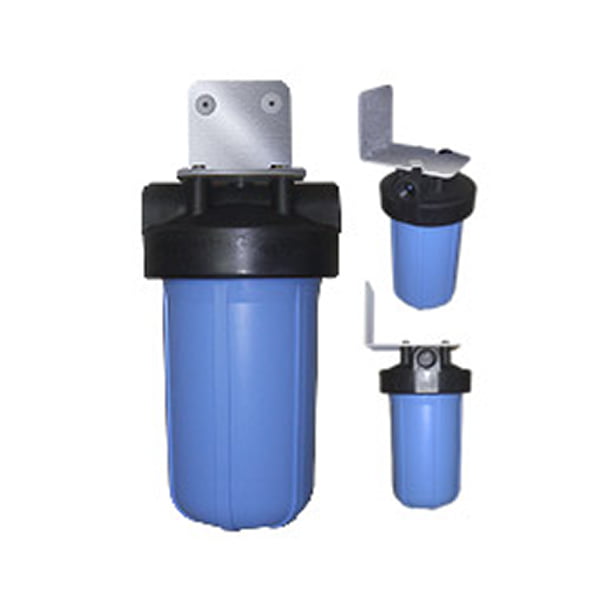
Pelican Sediment Filter System |
|
| Price: | $ |
| Micron Rating: | 5 |
| Water: | ? |
| Filtration Capacity: | 6-9 Months |
| Annual Cost: | $30 |
|
Our Rating
|
|
Pros
- This is typically used as a pre-filter for other Pelican water filtration or softening systems.
- Increases the effectiveness and life of other water treatment equipment.
- 5-micron rating is a good mix between effective sediment removal and longer filtering capacity without rapid clogging.
- 5 microns is 20 times smaller than the diameter of a human hair.
- There are 2 sizes available:
- Pelican BB10-P is a 10-inch filter.
- Pelican BB20-P is a 20-inch filter. This one lasts longer than the smaller version.
- This kit comes complete with everything required for an easy install.
- Heavy duty whole house water filter housing.
- Filter cartridge.
- Mounting bracket with screws.
- Filter wrench.
- With routine replacement, you can expect a filter life of 6-9 months. Expect to pay around $30 per replacement which is okay.
Cons
- Nothing.
Best for
The Pelican is our second top pick for standard sediment filtration.
7. Best Customizable Sediment Filters: Culligan WH-HD200-C & WH-S200-C
If you want a standard-sized sediment water filter for your whole house with a built-in bypass valve, a pressure release button, and fast filter replacements, the Culligan WH-HD200-C or the WH-S200-C could be it.
Both are great for people on a small budget. Eager to learn more?

Culligan WH-HD200-C |
|
| Price: | $ |
| Micron Rating: | 1-50 |
| Water: | 4-10 gpm |
| Filtration Capacity: | 8,000-24,000 gal |
| Annual Cost: | Affordable |
|
Our Rating
|
|
Pros
- Both sediment filters can be used on well water. Of course, city water is fine, too. They protect plumbing and appliances from potential damaging due to dirt and debris.
- You can combine both WH-HD200-C and WH-S200-C with different cartridge filters. And they don’t even need to be from Culligan thanks to industry standard sizes.
- The various filters (spun cartridge filters, pleated cartridge filters, etc.) are designed to target different sediment contamination issues. Some filters only remove sediment, rust, scale, and coarse sand, while others also eliminate very fine sand and silt.
- Micron ratings (1-50), flow rates (4-10 gpm), and filtration capacities (2-6 months, 8,000-24,000 gallons) vary likewise.
- How do the two filter models differ?
- The WH-HD200-C is a heavy duty version with 1-inch inlet/outlet ports for faster water flow.
- The WH-S200-C is the standard version for ¾-inch pipes.
- The filters are NSF-certified by the WQA against NSF Standard 372 for low lead compliance. The WH-HD200-C has also earned an NSF 42 certification for structural integrity and material safety. The WH-S200-C is NSF 61-certified for material safety.
- The clear housing allows you to see your filter at work and determine its current state – great for timely filter changes.
- All parts are included from O-ring to housing wrench and mounting bracket.
- Using the bypass valve you can replace the filter without turning off the water supply to your entire house.
- Obviously, you need to change filters periodically. The filter life monitor tells you when. It takes out all the guesswork by flashing 90 days after the last reset.
- Total annual cost? Definitely affordable with a little more for the heavy duty version and somewhat less for the standard unit.
- By the way, a 2-year limited warranty is part of the deal.
Cons
- Plastic threads on the inlet and outlet ports are prone to leaking due to cross-threading.
- Valve of bypass may be hard to use.
Best for
The Culligan WH-HD200-C and WH-S200-C are best for people who like the idea of customization and experimenting with different cartridge types and filter materials.
- Best Whole House Water Filtration Systems of 2024
- Best Whole House Well Water Treatment Systems
- BOS Water Softener and Filtration System Reviews
- Reviews of the Best Whole Hosue Sediment Water Filter Cartridges
- The Best Whole House Water Filter Cartridges
- Iron Filter Reviews: What’s the Best System?
- What’s the Best 3-Stage Whole Home Water Filter?
- Best Whole House Well Water Filter Cartridges
- Best Spin-Down Sediment Water Filter
- List with All Whole House Water Filters Featured on BOS
Best Sediment Filter for Well Water – Comparison List
How do the best sediment filters for well water perform when directly compared?
(Mobile Hint: Swipe to Scroll)
| Sediment Filter | Price | Microns | GPM | Capacity | Annually | Additional Info |
|---|---|---|---|---|---|---|
| Crystal Quest Turbidity Whole House Filter | $$$ | 5 | 9-13 | 750,000-1,000,000 gal | $40 | |
| USWS Spin-Down Sediment Filter for Well Water | $ | 15-711 | 25 | – | – | |
| SpringWell 5-Micron Sediment Filter for Well Water | $ | 5 | 20-35 | 6 Months | $35-65 | |
| Home Master Custom Sediment Filter for Well Water | $$ | 0.2-30.0 | Up to 20 | Up to 1 Year | Varies | |
| Waterdrop WD-RPFK Whole House Spin Down Sediment Water Filter | $ | 50 | 20 | – | – | |
| Pelican Pre-Filters | $ | 5 | ? | 6-9 Months | $30 | |
| Culligan WH-HD200-C & WH-S200-C Cartridge Sediment Filters | $ | 1-50 | 4-10 | 8,000-24,000 gal | Low |
Buying Guide: How to Choose the Sediment Well Water Filter That’s Best for You
The following are key features worth considering when shopping for a sediment filter for well water. They will help you choose the right on for your needs and budget.
Well or City Water Source?
The first thing you need to consider is your water source. Different water sources have varying levels of contaminants. For instance, city and well water differ greatly in sediment amount, sizes and types.
Therefore, it is crucial to know your water source before purchasing a sediment filter.
- Well water is often heavily contaminated and might contain different sediment types (small and large).
- On the other hand, city water usually is less affected. It might even contain little to no sediment at all.
However, being on a municipal water supply doesn’t mean you do not need to filter for sediment. Sediments – small or large – must be removed to ensure maximum purity and avoid damage to your plumbing system, fixtures, and appliances.
So what to do? Conduct testing! It’s the only way to determine the type and level of sediment you are dealing with.
The Type of Sediment in Your Water
Your home water can have different types of sediments, including silt, clay, small and coarse sand, rocks, and even the remains of animals and plants. They can be as large as a little boulder and as small as a tiny grain of salt.
As mentioned, you need to identify the type of sediment before buying a filter.
The particulate size also varies. For instance, well water might have larger particles than city water. Therefore, you cannot depend on any next best filter to remove all sediments from your water.
But once you’ve identified the type of sediment and its size, you’ll be able to determine the filter type you want to purchase.
Also, while installing a sediment filter is the first step to ensure clean water, using it alongside other water treatment systems – like whole house well filters – removes maximum contaminants from your water.
Micron Ratings and Mesh Sizes
After analyzing the sediment type in your water, you need to choose the micron rating or mesh size of your sediment filter accordingly.
Micron ratings indicate the size of filtration pores in a regular sediment filter cartridge. Common ratings are 1, 5, 10, and 50 microns. Mesh size is used for spin-down sediment filters only. Here, you find figures like 100 or 150 microns.
Any micron rating or mesh size determines how tiny a particle your sediment filter can remove.
Remember, a smaller micron rating can remove smaller particles better. For instance, a sediment filter with a 1-micron rating can remove much smaller sediment than a filter with a 50-micron rating.
But does a low micron rating always indicate a better sediment filter? I’m afraid not.
If your water has large metal chips, dust, and sand particles, choosing a small micron rating might be a bad idea. The large particles will get stuck in the filter and clog it in no time. As such, you’ll need to wash and replace your filter regularly to get the water flowing. This will just add up to the costs.
So, make sure you purchase the micron size per your water requirements. Here is a general guideline.
- A 100 or 150-micron mesh size is suitable for everything from pipe scale to rust and grit
- 50 to 100 microns will trap sand-like sediment particles, some cysts, and fine dust
- A 10-micron (or lower) rated filter will trap bacteria and most other microorganisms as well as silt and clay.
Filter Installation
Several companies have given a lot of attention to engineering systems for easy installation. However, not all whole house sediment filters are easy to install.
Make sure you thoroughly read the instruction manual before installing one.
That said, hiring a plumber for filter installation is better if you are not confident about your DIY skills.
Besides considering the setup process, you also need to find the right place to hook up your new unit. Remember: A whole house a.k.a. point-of-entry filter needs to be plumbing into the main water line.
Maintenance (Filter Capacity)
Whole house sediment water filters are ever evolving and becoming less reliant on maintenance. But that doesn’t indicate they do not need your attention and care at all.
You need to investigate filter capacity and replace accordingly. Some models can also be washed and reused (more on this in a bit).
This is why it’s always best to go with a filter that has a long filter life – think gallon capacity.
Reusability
When shopping for a pleated filter, make sure you go for a reusable one to get the most value out of the money you’re spending.
Purchasing a reusable sediment water filter means you no longer need to change the cartridge too frequently as they’re easy to wash and put back to work.
Hand cleaning is usually the easiest option here.
Water Pressure and Flow Rate
Ideal operating pressure for a residential filter is around 60 psi. This can be measured using a pressure gauge. And it’s important to do so before installing a sediment filter, because extremely high water pressure could cause damage.
On the flip side, low pressure can disrupt your home’s flow rate. Usually, this is not that big of a deal with sediment filters as they barely affect pressure, but in case you already suffer from low water pressure/flow, a sediment filter won’t improve the situation.
Filter Size
There are four standard sizes for cartridge filters:
- 2.5 x 10 inches
- 4.5 x 20 inches
- 2.5 x 10 inches
- 4.5 x 20 inches
2.5” x 10” and 2.5” x 20” are for point-of-use applications. 4.5” x 10” and 4.5” x 20” are for whole house use.
Large cartridge sizes are important as they have a direct impact on water pressure and flow. Simply put, a smaller filter cartridge can only process so much water at any given time.
Besides, a few manufacturers like to come up with their own proprietary sizes which we recommend to stay away from if possible. For one, they are more costly, and it can be difficult to get suitable replacement filters in future.
Warranty
Whole house sediment filters are quite affordable so warranty isn’t one of the critical factors when shopping. Still, a reputable manufacturer should back its sediment filter with a warranty in our opinion. This indicates confidence about the quality of products.
Cost
Like we said, a sediment filter – regardless of point-of-use or point-of-entry – is pretty affordable.
And when you consider the fact that they may save you hundreds or even thousands of dollars in maintenance and repairs of your home’s pipes and appliances, they are a worthy investment.
Methodology: Why Trust Us?
Ready for a behind-the-scenes look at our awesome methodology for reviewing sediment water filters? Buckle up, here we go!
- Criteria Creation: We used our years of experience and research to create a list of 11 important attributes that every product should be measured against.
- The Long List: With our criteria in hand, we scoured the internet for almost every promising sediment filter we could find. We ended up with a whopping 16 options. Talk about choices!
- Deep Dive: We dove headfirst into product manuals, descriptions, third-party certifications (think NSF), and warranties. We even reached out to the top brands for interviews. We wanted to know exactly what we were dealing with and test their support levels. This narrowed our list down to 10 contenders.
- User Feedback: We didn’t stop there! We scoured various platforms for feedback and ratings from real users. We wanted to hear from the people who had actually used these filters. We rejected the fakes and only considered the real deal.
- Hands-On Experience: Time for some fun! We ordered and installed some (not all!) of the remaining 7 filters on a suitable water supply. We let each operate for a minimum of 2 weeks.
- Pros vs Cons: Now, it was time to digest all this information and convert technical specs into easy-to-understand insights, so you can make an informed decision.
Side Note: We take our independence and unbiased reporting seriously. All the information and ratings you see here are independent and fact-checked by professionals. We’ve got your back!
More on Sediment Filters
What Is a Sediment Filter?
A sediment filter is designed to trap and remove sediment and other dirt, rust, silt, and sand from your house water. In other words, it acts as a barrier against different types of solid particles suspended in the water.
Sediments can clog your household plumbing, foul your drinking water, and reduce the life of water-using appliances like coffee maker, washing machine, water heater, or dishwasher.
The suspended particles might not be visible to the naked eye, but they can lead to all kinds of issues including some related to health, and removing them is essential.
Whether you’re on city water or well water, installing a sediment filter is always a good idea.
Why Do You Need a Sediment Filter for Well/City Water?
When it comes to sediments, well water often has more contaminants than a city water supply. However, it doesn’t signify that city water is 100% pure. Therefore, no matter your water source, getting a sediment filter can be a good choice.
Below, we’ll discuss a few reasons why getting a sediment water filter for your whole house might be helpful.
1. Improve Overall Water Quality
Suspended particles in your water don’t only make it dirty but in many cases foul-smelling, too, and thus difficult to drink.
Sediment filters remove particles like dust, sand, silt, rust, and other organic materials improving water quality. On top of that, your water tastes fresh and is odor-free.
This, in turn, encourages you and your family members to drink more which keeps you hydrated and healthy.
2. Protect Your Plumbing System and Appliances from Damage
Sediments in your water can damage your plumbing system and household appliances. Your house pipes and drainage lines can easily get clogged.
Moreover, any appliances that use water like a coffee maker, dishwater, or washing machines can get damaged easily.
Sediment removal protects your home appliances and plumbing.
3. Protect Other Water Treatment Equipment
If you’re concerned about your family’s health, you might have installed additional water treatment equipment like a reverse osmosis system or activated carbon filters.
Sediments in water can damage the components of these water treatment units. However, clean water ensures a longer life for any other equipment installed in your home.
4. UV Disinfection
Sediments in water can reduce the efficacy of a UV filter system, inhibiting the ability of UV light to target waterborne and potentially disease-causing microbes. How?
Sediments create a shadow for bacteria etc. to hide behind during the UV process. This way, they are not exposed to the radiation and live on.
Therefore, it won’t be wrong to say that a sediment filter can promote or improve UV disinfection.
5. Water Softeners
Likewise, if you won’t install a sediment well water filter before your water softener, dirt and sand may enter the system and damage not only the moving parts but the resin bed in particular. A fouled resin bed lacks capacity and requires more frequent regen cycles.
Pros & Cons of Sediment (Well) Water Filters
Here is a list of some good and bad points of sediment well water filters:
Pros
- The best sediment filter for well water effectively removes dirt, silt, sand, rust, and other organic and inorganic materials from water.
- Improve the taste of water
- Promote UV disinfection
- Protect your plumbing and water treatment appliances
- Cartridge sediment filters are easy to install.
- They reduce your carbon footprint on the planet as you can skip bottled water.
- A sediment filter is a one-time investment and allows you to enjoy clean water for months to years.
- No matter the sediment type or size in your home water, you’ll have a lot of filter options to choose from.
- The filter complements other water treatment systems installed in your home.
- Finer filters can even remove contaminants including heavy metals and microorganisms.
Cons
- Cannot reduce TDS (total dissolved solids)
- Don’t remove the majority of hardness minerals
- Might not remove all unpleasant taste and odor of the water
The Types of Sediment Filters and How They Work
All sediment filters are designed to perform a single function: getting rid of suspended particles in water and making it clean. Below, we’ve discussed how the different types of sediment filters work.
1. Pleated Cartridge Filters
Pleated sediment filters, also known as surface filters, have a folded design with a high surface area. This enables them to catch lots of particles like silt, sand, dust, and rust and restrict them outside the filter medium.
The large surface area also allows for removing sediments without decreasing water pressure.
Pleated sediment filters are typically made out of polypropylene or a thin polyester sheet. While these filters typically trap greater sediments, they allow small particulates to pass through.
You can choose the filter size depending on how many members live in your household. However, a larger filter capacity means you won’t need to change the cartridges too often, which is a plus.
Filter Advantages
- Washable and reusable filters available
- Higher water flow rate
- Little to no pressure drop
- High capacity
- Long-lasting
2. String-Wound Filters
String-wound filters typically feature cotton string, polypropylene, or polyester, wrapped around a solid core.
These cartridges trap both large and small particles as the water flows, keeping them from entering the main supply.
Filter Advantages
- Better dirt holding capacity
- Trap large and small dirt particles
- Don’t clog because of unique cartridge structure
3. Melt-Blown Filters
Melt-blown whole house sediment filtration cartridges are made from PP (polypropylene) and are a kind of depth filter ideal for removing particles throughout the entire volume of the filtering material.
These types of filters can effectively remove fine particles smaller than 10 microns.
Filter Advantages
- Depth layer ensures maximum sediment filtration
- Long filter life because entire filter material collects dirt
4. Spin-Down Sediment Filters
A spin-down filter is available in various filtration sizes, from 20 to 1,000 microns. It’s reusable and flushable, making it perfect for whole-house filtration.
The centrifugal force directs the sediment particles outwards, where they get trapped in the mesh.
When spin-down sediment filters get clogged, all you need to do is open the valve and flush the trapped sediments with water.
What’s more, a spin-down sediment filter can work with water pressure of up to 150 psi and therefore is unlikely to cause a drop in flow rate. Nonetheless, the maximum allowed water pressure may vary depending on the type of model you buy.
Filter Advantages
- High flow rate
- A few are equipped with an auto flush feature
- Small size
- Reusable and flushable
- No need to replace the cartridge
5. Multi-Gradient Sediment Filters
Just like the name suggests, multi-gradient sediment filters contain multiple filtration screen layers with different micron sizes. The outer layer consists of a large rating, while the inner layer has a small rating for efficient cleaning.
Due to several layers and depth filtration, multi-gradient filters can trap a large number of sediments over a long time.
Filter Advantages
- Multiple layers ensure maximum sediment removal
- Long-lasting
6. Spun Cartridge Filter
These cylindrical-shaped filters are made of melted polypropylene. They consist of several layers to block sediments from entering a water supply.
The outermost layer has a high micron level and is more porous. This traps larger sediment particles like dirt, rust, and sand.
As the water moves through the layers, they become less and less porous. As a result, even the tiniest contaminants are filtered out.
Using a spun cartridge filter with another whole house filtration system can step up the water game for you.
Filter Advantages
- Multiple layers ensure maximum filtration
- Layers become less and less porous, filtering out microscopic contaminants
Tips & Advice on How to Clean a Sediment Water Filter
Cleaning and maintaining your whole house sediment water filter improves its life and ensures optimum water flow.
Spin-Down Filters
Regular flushing washes off larger sediments in flushable spin-down filters. But, small particles can remain on the mesh filter screen so watch out.
To ensure maximum performance, you need to take out the mesh filter and clean it. You can use a light brush to remove the fine sediments.
Further, you can also dip it in a vinegar solution to get rid of tougher, stubborn scales. However, make sure you’re not using any harsh chemicals as they might damage the mesh filter.
Pleated Sediment Filter Cartridge
If you own a pleated sediment filter cartridge that’s reusable, here’s how you can clean it.
- Close the systems shut-off valve.
- Press the pressure relief button.
- Remove the clogged whole house filter cartridge from the filter and brush it gently to remove the fine sediments.
- Keep the filter cartridge under running water to ensure maximum removal.
- Use fresh water to clean the filter housing.
- Place the unclogged and clean cartridge back in the filter housing.
- Close the filter housing tightly.
How Often Do You Need to Change a Sediment Filter?
How often you need to change a sediment filter depends on your water usage, quality, and the filter cartridge itself. To illustrate:
- A household with 1-2 people who work all day will use minimal water. Naturally, they’ll enjoy the longest life of their cartridge filters.
- On the other hand, a family of six or seven people will constantly utilize a lot of water. Hence, they struggle to keep their filters functioning optimally and need to replace them more often.
Another factor determining the life of a sediment filter is how often you clean or flush it.
Typically, a cartridge-type sediment filter lasts for 6-12 months.
There are several ways to determine when your sediment filter needs to be changed. For instance, if you notice a drop in water pressure, it signifies your filter is clogged and requires renewal.
Further, you can check your water filter for sediments residing on the filter screen. If you notice a brownish color it probably needs to be replaced.
How to Replace
If your water filter housing contains a non-reusable sediment filter cartridge, follow these instructions to replace it:
- Open the filter housing using a wrench.
- Pull out the clogged filter cartridge and dump it.
- Use fresh water to clean the sediment filter housing.
- Place a new sediment cartridge into the filter housing.
- Close the filter housing tightly.
What Are Sediments?
When earth materials are broken down through the process of erosion and weathering, they form sediments.
Sediments typically consist of rocks, sand, minerals, or organic particles from microbes or plants and can be found in well water and city water alike. Nonetheless, well water is more prone to these particles.
Sediments affect water quality in several ways. Besides giving it an unappealing look, taste, and smell, they can destroy a plumbing system, water appliances, and pumps by clogging them. Additionally, drinking such water can pose a health risk – but only in rare cases.
Therefore, getting rid of sediments is crucial for home appliances and can be important for health reasons, and there’s no better option than sediment filters.
Frequently Asked Questions (FAQ)
- How do you filter sediment out of well water?
Simply put, by using a sediment water filter. There are no sediment filters specific to well water, though. You can use just any sediment filter suited for the type of contamination found in your well water supply. - Should I install my sediment filter for well water before the pressure tank?
Yes, a sediment filter should go before the pressure tank so that it can act as a first line of defense preventing dirt from entering and settling at the bottom of the tank, meddling with its performance in the long run. - Where should a sediment filter be placed?
In a whole house setup, a sediment water filter should be placed before any other equipment. This includes pressure tanks, water softeners, other whole house water filters, water heaters – you name it. This way a sediment filter protects all appliances against clogging. - Why does my well water have so much sediment?
First of all, a certain sediment level is normal. Excess sediment concentration, however, may stem from poor well bedrock or a damaged well. Besides, a newly installed well can also have higher sediment content due to the drilling process having released a lot of particles into the water source. - How long do sediment filters last?
How long a sediment filter lasts depends on 3 factors: 1. The filter itself. Certain types of whole house sediment water filters last longer than others. 2. Your water quality. The more dirt you have in your water, the shorter the filter life. 3. Your water usage. The more water you use, the sooner a filter runs out of capacity.
With that in mind, most filters last anywhere between 3 months and 1 year. - Is it safe to drink well water with sediment?
Yes, it is. Well water with sediment only rarely causes health problems. You might not like the taste of the water, though. - What micron sediment filter for well water should I use?
This depends on the type, size, and amount of sediment you have in your water supply. You can find out more about this by having your contaminated water tested.
Questions? Ask away!
Information provided on BOS is for educational purposes only. The products and services we review may not be right for your individual circumstances.
We adhere to strict editorial guidelines. Rest assured, the opinions expressed have not been provided, reviewed, or otherwise endorsed by our partners – they are unbiased, independent, and the author’s alone. Our licensed experts fact-check all content for accuracy. It is accurate as of the date posted and to the best of our knowledge.

